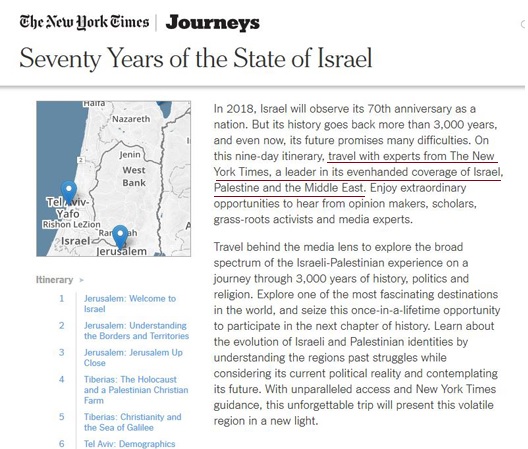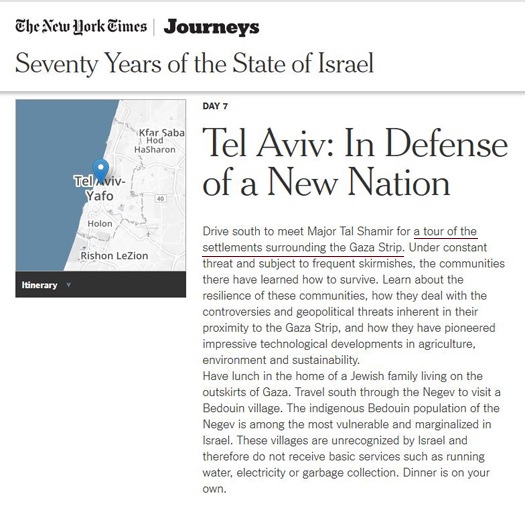From Palestine to Gaza Area Settlements, Journey Into Times Coverage
Aug. 7 Update: New York Times “Journeys” Corrects on Gaza Area “Settlements”
In an illuminating and ironic gem, The New York Times markets its “Journeys” tour to Israel and the West Bank as follows:
On this nine-day itinerary, travel with experts from The New York Times, a leader in its evenhanded coverage of Israel, Palestine and the Middle East.

Referring to the West Bank as “Palestine” contravenes standard New York Times style. References to a modern “Palestine” in the West Bank and Gaza are inaccurate, and those areas should be referred to the West Bank and Gaza or, where appropriate “Palestinian Authority territories.” National Geographic, The Los Angeles Times, and Voice of America have commendably corrected this very same point in recent weeks.
By inaccurately referring to the West Bank as “Palestine,” The New York Times unintentionally tips off perceptive and informed readers that far from being “a leader in its evenhanded coverage,” the Gray Lady has a longstanding tilt against Israel. As Margaret Sullivan, then public editor exhorted in 2014:
Strengthen the coverage of Palestinians. They are more than just victims, and their beliefs and governance deserve coverage and scrutiny. Realistic examinations of what’s being taught in schools, and the way Hamas operates should be a part of this. What is the ideology of Hamas; what are its core beliefs and its operating principles? What is Palestinian daily life like? I haven’t seen much of this in The Times.
(The Times recently eliminated its public editor positon. Not a promising sign for those concerned about “evenhanded coverage.”)
The “Journeys” promotional material also refers to “settlements surrounding the Gaza Strip.” But the term “settlements” in The New York Times (and in common usage) is used specifically to denote communities built in disputed territory, and in the Western milieu it is not used in reference to villages inside Israel. This usage is especially problematic in light of the fact that the newspaper often raises questions about the legal legitimacy of “settlements.” The inaccurate message to readers, then, is that these towns in Israel near the Gaza Strip are somehow controversial or disputed.

So while The Times gears up for an “evenhanded” tour around “Palestine” and the “settlements surrounding the Gaza Strip” to mark “Seventy Years of the State of Israel,” we invite readers to a discovery journey of over 80 New York Times errors — all of them tilted in one direction (against Israel) — and all of them corrected after CAMERA’s intervention.
More from SNAPSHOTS
Mahmoud Abbas’ Diatribe Threatening Israel Included Bogus Canaanite Claim
September 10, 2019
Palestinian Authority President Mahmoud Abbas’ recent anti-Israel diatribe that aired on PA TV was monitored and translated by Palestinian Media Watch (PMW). Excerpt: "I say to [Israel]: Every stone you have built on our land [...]
CNN Calls House’s Unifying Anti-BDS Vote ‘Divisive’
July 24, 2019
Yesterday, in an overwhelming vote of bipartisan support, the House of Representatives voted 398 to 17 to adopt a resolution opposing the anti-Israel BDS (boycott, divest, sanctions) campaign. Yet, CNN's headline casts the unifying vote [...]
NY Times Cites Poll, Hides Palestinian Support for Violence
July 9, 2019
The New York Times has struggled to accurately describe polls this year. In January, editor Jonathan Weisman misrepresented Pew polling data to describe a nonexistent surge in Israeli support for the United States under President [...]
CNN’s Zakaria Indulges Palestinian Propagandist Hanan Ashrawi
June 9, 2019
Fareed Zakaria’s weekly Cable News Network (CNN) program (grandiosely named “Global Public Square”) June 9 broadcast included a discussion of the current U.S. Middle East peace plan with guests Hanan Ashrawi (Palestinian Authority official) and [...]
In Robert Bernstein Obit, AFP Inappropriately References His Judaism
May 29, 2019
Robert Bernstein (Courtesy the New Press) In its obituary yesterday for American publisher Robert Bernstein, Agence France Presse inserted an inappropriate reference to the Human Rights Watch founder who later turned on the organization due [...]


